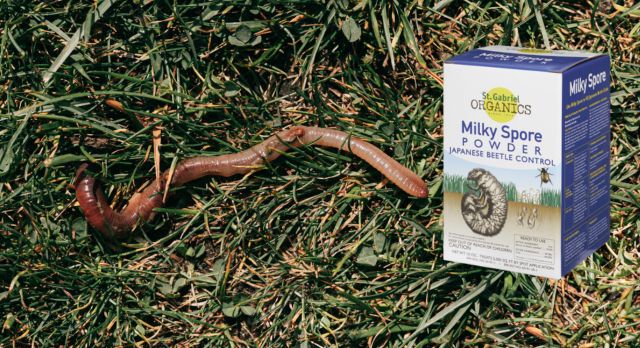Does Milky Spore Kill Earthworms? The Surprising Truth
Earthworms are invaluable allies in maintaining healthy soil and promoting plant growth. As gardeners and homeowners, it’s essential to be mindful of the impact of any pest control methods on these beneficial creatures. Milky spore is a popular organic product used to control Japanese beetle larvae, but does it harm earthworms?
In this article, we will explore the effects of milky spore on earthworms, providing you with the information you need to make an informed decision about pest control in your garden.

What is Milky Spore and How Does it Work?
Milky spore is a biological pesticide made up of spores from the bacterium Bacillus popilliae. It is used to control Japanese beetle grubs in lawns and gardens.
Here’s how milky spore works:
- The spores are applied to soil through granular applications, powders, or liquid drenches.
- When a Japanese beetle grub ingests the spores, the spores germinate inside the grub and multiply.
- The multiplying spores fill the bloodstream with the grub and essentially suffocate it. The grub turns yellowish and eventually dies within 1-3 weeks.
- As the grub decomposes in the soil, it releases billions of new milky spore bacteria. These spores can survive in the soil for many years.
- When new grubs hatch and start feeding on grass roots, they pick up the milky spore spores in the soil. The cycle then repeats itself.
Do Milky Spore Harm Earthworms?
Many gardeners wonder if applying milky spore to their lawn or garden beds will negatively impact beneficial earthworms in the soil.
The good news is milky spore does NOT kill or harm earthworms when used as directed. Here’s why:
- Milky spore is target-specific. The spores only infect and kill the Japanese beetle grubs. They do not affect other soil organisms like earthworms.
- Earthworms don’t ingest the spores. Earthworms are not susceptible to milky spore because they do not actually consume the spore granules or powder. The spores must be ingested to be effective.
- Low toxicity to non-target organisms. Milky spore has very low toxicity to birds, pets, plants, and pollinators. It’s considered non-toxic to aquatic invertebrates like worms.
- Deeper soil profile. Earthworms thrive in the top 3-8 inches of soil. But milky spore applications target grubs deeper in the soil profile where they feed on roots.
- Routine use does not accumulate. Milky spore applications don’t accumulate in the soil over time. The spores degrade naturally. So repeated applications over many years do not increase effects on earthworms.
So you can confidently apply milky spore to control grubs without worrying about harming your beneficial earthworm population!
Evidence That Milky Spore Does Not Harm Earthworms
Several scientific studies have looked at the effects of milky spore on earthworms. The findings show no negative impacts:
- A 2013 study by the University of Kentucky examined earthworm populations after long-term use of milky spore over 25 years. They found no difference in earthworm abundance between treated and untreated soils.
- Research by Ohio State University in 1995 found no toxic effects on earthworms exposed to high concentrations of milky spore spores over a 28 day period.
- A 1990 study observed earthworm activity in soil treated with milky spore applications. They saw normal earthworm activity and no avoidance of treated areas.
- Field studies of milky spore use report no reductions in earthworm activity or populations over time. This includes research from Michigan State University and Purdue University.
The evidence clearly shows that earthworms are unaffected by milky spore applications when used as directed. Both lab and field studies support this.
Benefits of Combining Milky Spore and Earthworms
Using milky spore together with nurturing a healthy earthworm population offers multiple benefits:
- Dual control of grubs. Milky spore provides long-term microbial control of grubs. Earthworms eat grubs and other pests, providing immediate control.
- Improved soil health. Earthworm tunneling and castings enhance soil structure. Milky spore degrades thatch layers made up of dead turfgrass.
- Reduced need for chemical insecticides. Milky spore and earthworms reduce reliance on chemical grub killers that may inadvertently harm earthworms.
- Natural and sustainable pest management. Both milky spore and earthworms are part of a natural, organic approach to controlling white grubs without harsh synthetic pesticides.
- Cost-effective. Promoting earthworm populations is free. Milky spore costs much less than repeated chemical treatments.
Using milky spore and earthworms together provides safe, effective, and sustainable grub control without harming beneficial earthworms!
Related Article – Does Merit Kill Earthworms?
Key Takeaways
- Milky spore is a natural biological pesticide made of Bacillus popilliae bacteria. When ingested by Japanese beetle grubs in the soil, the bacteria multiply and kill the grubs.
- Numerous scientific studies have shown milky spore does NOT harm or kill earthworms or reduce their populations and soil activity.
- Earthworms do not ingest the milky spore granules or spores. The worms live in a different soil zone than the grubs targeted by milky spore.
- Using milky spore together with promoting earthworm populations provides safe, effective, natural grub control and enhances overall soil health.
- Both home gardeners and commercial turf managers can use milky spore without worrying about negative impacts to beneficial earthworms in the soil ecosystem.
So in summary, milky spore offers an environmentally friendly way to control destructive Japanese beetle grubs without harming earthworms! By using milky spore and promoting earthworm populations, you can cultivate a healthy, pest-resilient lawn and garden soil.
